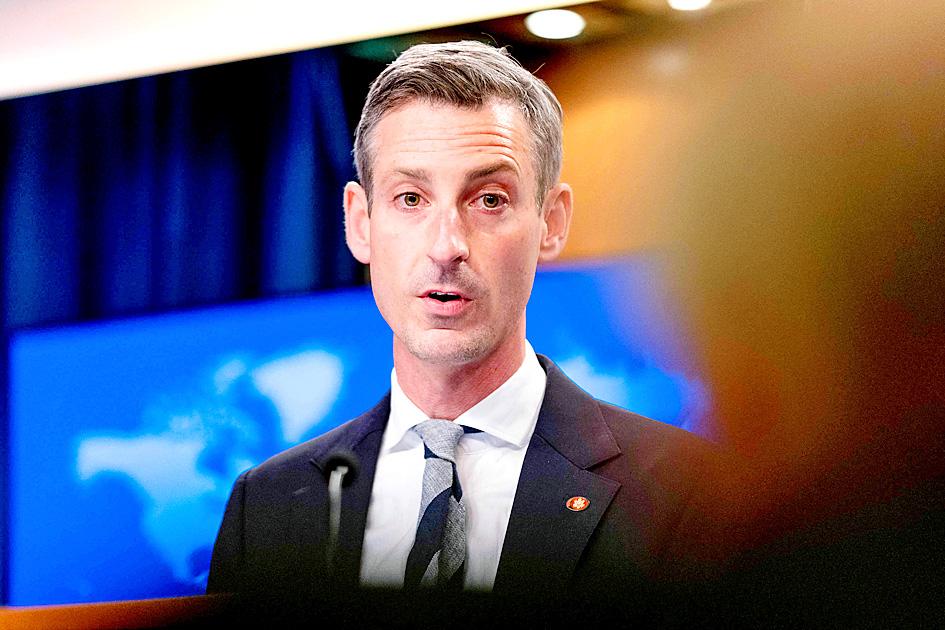The US Department of State yesterday criticized Beijing over its misrepresentation of the US’ “one China” policy in the latest diplomatic salvo between the two countries over a bid by Taiwan to regain its observer status at the World Health Assembly, the decisionmaking body of the WHO.
“The PRC [People’s Republic of China] continues to publicly misrepresent U.S. policy,” Department of State spokesman Ned Price wrote on Twitter.
“The United States does not subscribe to the PRC’s ‘one China principle’ — we remain committed to our longstanding, bipartisan one China policy, guided by the Taiwan Relations Act, Three Joint Communiques, and Six Assurances,” he added.

Photo: AFP
Price’s comments came three days after Chinese Ministry of Foreign Affairs spokesman Zhao Lijian (趙立堅) expressed Beijing’s displeasure at Washington’s stance, saying: “The US’ latest modification of the fact sheet is a trick to obscure and hollow out the one China principle.”
“Such political manipulation of the Taiwan question and the attempt to change the status quo across the Taiwan Strait will hurt the US itself,” he told a routine news conference in Beijing.
Zhao was referring to a change to the department’s fact sheet on Taiwan that removed statements that Washington acknowledged Beijing’s “one China” position and did not support Taiwanese independence.
On Sunday last week, US President Joe Biden signed into law bill S.812 to stipulate that Washington must develop a plan to back Taiwan’s bid to take part in the WHO and other international organizations.
The legislation — which passed the US Congress with bipartisan support — lauded Taiwan as “a model contributor to world health, having provided financial and technical assistance to respond to numerous global health challenges.”
Taiwan has yet to receive an invitation to this year’s WHA, which is to be held from today to Saturday next week in Geneva, Switzerland.
The US long maintained that its “one China” policy is distinct from Beijing’s “principle” in that China asserts sovereignty over Taiwan, while Washington takes no position on the issue, David Stilwell, assistant secretary of state for East Asian and Pacific affairs, told a US-based think tank in September 2020.
Washington’s interest is that “the Taiwan question be resolved peacefully, without coercion and in a manner acceptable to the people on both sides of the [Taiwan] Strait,” he said, adding that the US has “a commitment to assist Taiwan in its self-defense” in accordance with the Taiwan Relations Act.

SECURITY: As China is ‘reshaping’ Hong Kong’s population, Taiwan must raise the eligibility threshold for applications from Hong Kongers, Chiu Chui-cheng said When Hong Kong and Macau citizens apply for residency in Taiwan, it would be under a new category that includes a “national security observation period,” Mainland Affairs Council (MAC) Minister Chiu Chui-cheng (邱垂正) said yesterday. President William Lai (賴清德) on March 13 announced 17 strategies to counter China’s aggression toward Taiwan, including incorporating national security considerations into the review process for residency applications from Hong Kong and Macau citizens. The situation in Hong Kong is constantly changing, Chiu said to media yesterday on the sidelines of the Taipei Technology Run hosted by the Taipei Neihu Technology Park Development Association. With

A US Marine Corps regiment equipped with Naval Strike Missiles (NSM) is set to participate in the upcoming Balikatan 25 exercise in the Luzon Strait, marking the system’s first-ever deployment in the Philippines. US and Philippine officials have separately confirmed that the Navy Marine Expeditionary Ship Interdiction System (NMESIS) — the mobile launch platform for the Naval Strike Missile — would take part in the joint exercise. The missiles are being deployed to “a strategic first island chain chokepoint” in the waters between Taiwan proper and the Philippines, US-based Naval News reported. “The Luzon Strait and Bashi Channel represent a critical access

‘FORM OF PROTEST’: The German Institute Taipei said it was ‘shocked’ to see Nazi symbolism used in connection with political aims as it condemned the incident Sung Chien-liang (宋建樑), who led efforts to recall Democratic Progressive Party (DPP) Legislator Lee Kun-cheng (李坤城), was released on bail of NT$80,000 yesterday amid an outcry over a Nazi armband he wore to questioning the night before. Sung arrived at the New Taipei City District Prosecutors’ Office for questioning in a recall petition forgery case on Tuesday night wearing a red armband bearing a swastika, carrying a copy of Adolf Hitler’s Mein Kampf and giving a Nazi salute. Sung left the building at 1:15am without the armband and apparently covering the book with a coat. This is a serious international scandal and Chinese

COUNTERINTELLIGENCE TRAINING: The ministry said 87.5 percent of the apprehended Chinese agents were reported by service members they tried to lure into becoming spies Taiwanese organized crime, illegal money lenders, temples and civic groups are complicit in Beijing’s infiltration of the armed forces, the Ministry of National Defense (MND) said in a report yesterday. Retired service members who had been turned to Beijing’s cause mainly relied on those channels to infiltrate the Taiwanese military, according to the report to be submitted to lawmakers ahead of tomorrow’s hearing on Chinese espionage in the military. Chinese intelligence typically used blackmail, Internet-based communications, bribery or debts to loan sharks to leverage active service personnel to do its bidding, it said. China’s main goals are to collect intelligence, and develop a